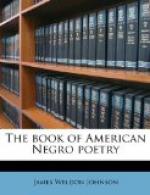It has a bearing on this entire subject to note that Dunbar was of unmixed Negro blood; so, as the greatest figure in literature which the colored race in the United States has produced, he stands as an example at once refuting and confounding those who wish to believe that whatever extraordinary ability an Aframerican shows is due to an admixture of white blood.
As a man, Dunbar was kind and tender. In conversation he was brilliant and polished. His voice was his chief charm, and was a great element in his success as a reader of his own works. In his actions he was impulsive as a child, sometimes even erratic; indeed, his intimate friends almost looked upon him as a spoiled boy. He was always delicate in health. Temperamentally, he belonged to that class of poets who Taine says are vessels too weak to contain the spirit of poetry, the poets whom poetry kills, the Byrons, the Burns’s, the De Mussets, the Poes.
To whom may he be compared, this boy who scribbled his early verses while he ran an elevator, whose youth was a battle against poverty, and who, in spite of almost insurmountable obstacles, rose to success? A comparison between him and Burns is not unfitting. The similarity between many phases of their lives is remarkable, and their works are not incommensurable. Burns took the strong dialect of his people and made it classic; Dunbar took the humble speech of his people and in it wrought music.
Mention of Dunbar brings up for consideration the fact that, although he is the most outstanding figure in literature among the Aframericans of the United States, he does not stand alone among the Aframericans of the whole Western world. There are Placido and Manzano in Cuba; Vieux and Durand in Haiti, Machado de Assis in Brazil; Leon Laviaux in Martinique, and others still that might be mentioned, who stand on a plane with or even above Dunbar. Placido and Machado de Assis rank as great in the literatures of their respective countries without any qualifications whatever. They are world figures in the literature of the Latin languages. Machado de Assis is somewhat




